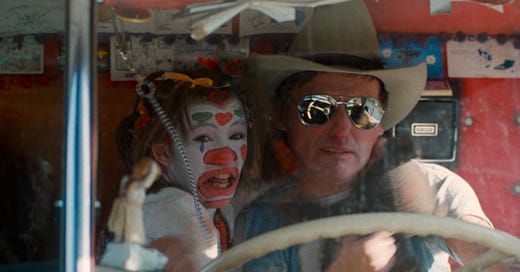Dennis Hopper Didn't Go Punk with "Out Of The Blue" - Punk Went Hopper
Brutal discomfort and a yearning for total freedom line this newly restored hardcore classic.
Dear Moviegoers,
“Do you believe that movies are also magic?” is asked of filmmaker Dennis Hopper by fellow auteur Orson Welles, in the documentary spinoff to The Other Side of the Wind, Hopper/Welles. A high and drunk - yet pretty lucid - Hopper responds, after downing a drink and with both an eye-roll and some exhaustive appreciation, “…right.” I’m uncertain if he doesn’t care or doesn’t care about not caring here, but his nearly grunted reply, more than the full response that followed, said so much. About how he felt regarding Welles’s further statement of “people believing anything in movies,” about older generations trying to figure out the newer ones, and about effing around with your chance at understanding by asking such questions.
Hopper was sincere at that moment, as was Welles. Personally, I loved the question that was asked, and maybe Hopper did too in some way. Maybe he loved it so much, he blew off the answer.
There’s magic everywhere, at least for those who seek it. Those who make it? Maybe awareness is irrelevant.
The newly restored, cleaned up and gorgeous scan of Hopper’s forgotten Out Of The Blue is making the theatrical rounds after many decades, and now lives as a sort of “where have you been all of my life” kind of watch. It’s a tough and rough story of youth in revolt against the world, and adults in rage against responsibility. It’s challenging from the get-go, but oh so worth the grilling upon its explosive conclusion. Think Orson Welles’s The Trial by way of Fear’s Saturday Night Live riot concert. Out Of The Blue wasn’t supposed to be what it turned out as, as Hopper fell into the directing role after the former was canned. What came out was nothing short of hardcore. Nothing short of classic.
It’s the story of Cebe (Linda Manz) - a name play on CB radio - and her father, played by Hopper himself. When the film opens to Neil Young’s sad but free theme song, singing the line "it’s better to burn out than fade away” feels not just as a prophecy for the fate of our characters, but as an observation for a given place in time. And that place is always now. Driving a semi-truck with a young Cebe dressed for Halloween (I believe) as some cross between a clown and a Raggedy Ann Doll, Hopper drinks and gets all too "cute” with his daughter. It’s played up as a drunk dad doing too much at once, but really is also a peek at something darker to come. His truck slams into a school bus filled with kids, in a piece that’s horrifically rendered with dummies and trashed metal. It burns into the brain.
Some years later, when her father returns from prison and picking up his behavior where he left off slowly but steadily, Cebe has taken to the punk lifestyle, with an affection for the souls of music who left this mortal coil early or eerily, from Elvis to Johnny Rotten. She, now a very young teen, is prey for adult predators, being leered at by creepy friends of the family and others she comes across. She handles herself by drifting into the city, smoking pot, getting into concerts, and into all sorts of trouble - her only comfort security comes in the form of a sucked thumb and a teddy bear.
Both she and her father are bonded in this self-destructive way, but as he goes further and further down the barrel, she moves further and further away from him, getting closer and closer to a repressed realization. Out Of The Blue indeed comes out of the gate with a reckless and restless mood, but it’s measured. The performances are all lit with heavy flames, especially from Manz’s Cebe. She’s ready for anything here, and goes as far as any actor ever has or ever can. And Hopper, of course, feels as if in a controlled way, very untamed and untethered.
It’s a loss for words that I’m experiencing in describing just how powerful the film is. Photographed and framed with a beautiful eye that matches that of the best modern artists, the shots and images of a heightened truth - of magic - certainly rivals the grit and grime of the real-feeling tragedy. Early on, Cebe goes to visit her mother at the diner she works at. Seated at either side of a table, the mother explains why she has lovers while Hopper is in prison. Between them, in the background, is one of her lovers, a "provider” that’s being emasculated before his eyes and ears. He looks on here and there, only to anxiously return to his paperwork. Out Of The Blue is filled to the brim with such emotional scenes, charged by every element available in cinema.
Even magic. Like Orson Welles said of believing anything in movies, Out Of The Blue is Dennis Hopper’s continued efforts at doing so his way. He did it before, and did it again. "… right.” 5/5
Visit Out Of The Blue online for more information





